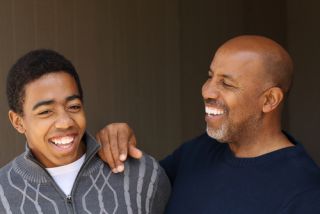Relationships
Ode To Dad (and Me)
Rethinking our relationships with our fathers
Posted June 21, 2015

As I write this post on Father's Day, I think about my own relationship with my father, who passed away 16 years ago. I was in my late 30s when he died, and we had not really gotten to really know each other as well as we might have. We missed mutual opportunities to grow, laugh, and endure many life challenges together. However, I was fortunate to have a warm expressive connection with him. I realize that now.
Gay men's relationships with their fathers can be tricky. The history may be fraught with disappointment: Dad dealing with the fact that his son isn’t quite the son he had envisioned and his son coping with his father's need to "cope" with who he is. Gay boys frequently protect themselves from their fathers' subtle (or not so subtle) disapproval by pulling away first. Withdraw before being withdrawn from! And then, of course, maintaining close relationships with other men becomes an ongoing challenge.
I have spent many sessions with my adult gay clients discussing pain not only from the past, but also in the present. It isn’t unusual for clients to share how their father used words like faggot or sissy when they were young, and used other aggression to navigate their own feelings of helplessness and confusion about having a gay son.
In adulthood, the distance caused by those early wounds often continues. Fathers may choose to stay emotionally separate for their own reasons—perhaps unable to open their hearts or minds to what they do not understand. And sons often give up somewhere along the way rather than face further humiliation or risk triggering feelings of despair.
However, my eternally optimistic stance, and the positive experience I have had doing family work with clients, leads me to encourage my clients to reconnect with their fathers while they still have the opportunity to do so. Unless circumstances are so traumatic that it will cause psychological damage for the client, I advise that it is better to be able to create some type of ongoing connection.
I have witnessed numerous successes where Father and Son have agreed to love and respect each other despite an emotional impasse. I have seen resentments being aired on both sides and something new being able to emerge so that they could begin to enjoy each other's love, even with the differences between them. This takes hard work. However, the rewards can be worthwhile, now and into the future.
Two clients come to mind. One is Mark, who, after a lifetime of not feeling he measured up to his father and being initially rejected by him around his coming out in his 20s, decided that it was time to “man up.” Now in his 40s, Mark was tired of living in the shadows of his father's expectations and never feeling as though he could match his father's accomplishments. When he found the courage to confront his father about his frustrations, they both learned how much they had in common, including keeping distance and holding a grudge! They had both wanted more closeness but neither could admit this to themselves let alone to one another. With my coaching, Mark asserted himself with his father and it didn’t take all that much for them to begin to make an effort. The payoff of connection and intimate conversations about family, careers, and personality traits has been tremendous. Mark dared to take one fresh step, which led to him embarking on a whole new journey with his dad.
The other client I think about is Lyle, who was about to have his first child with his partner. As angry and unresolved as he felt towards his father, due to earlier rejections and his absence, Lyle wanted his child to have a different experience with him, to have an involved grandparent. Though there were some disagreements at the beginning as to whose perception of history was right, the care for this child soon became the common ground that reconnected these two men. Lyle’s father has forged a very close relationship with his grandchild, and he and Lyle have such a strong bond at this point that it is as if there were never any problems. A good present really does reorganize the past sometimes.
Generally speaking, family members prefer to have a connection with each other. A son who feels let down by his father and can face this with him will actually reinforce his sense of himself as a strong person. Some of our greatest challenges come from adversity and our abilities to deal with it. Of course, as much as we may wish ueven now for 100 percent support from our fathers—in part to compensate for painful childhoods—this is unlikely. Instead, a good enough connection can yield great value for a number of reasons, including that love comes through no matter what.
I had the great good fortune to witness two young men marry each other today. Both fathers were at the ceremony in full support of their sons—accepting, present and weeping with joy. Cheers!
For those for whom this relationship is more difficult, consider pushing yourself to break down barriers rather than holding a grudge. In the time that has passed, perhaps you have built a network of support and have discovered your ease with self-love. Maybe it's a good moment to give the relationship with your father another chance. It's not that you need him like you did when you were a young child, it's more that the communication as adults can be different than it was and that this is a one-of-kind connection. Imagine that the person who once caused so much pain can become the person who helps you the most now. Finally, the feeling of success and growth that you experience will stem from your own stepping into strength rather than from your father's approval.
Consider the following:
Someone needs to break the ice
You will feel your power by taking the initiative.
Think progress
Instead of fantasizing something unrealistic, be appropriate with your expectations and take the risk. Any bit of closeness and progress will make you a happier guy.
Breathe deeply before you take the plunge
It is challenging to risk of re-connecting, and preparing your body first will allow you to proceed with greater clarity and confidence.
Imagine lightness
The burden of carrying a grudge weighs you down. Working through difficulties may actually be easier.
Enjoy the road ahead
Being connected to your father will enrich your life. Accept what it can be, even with limitations and enjoy what you both can have.




